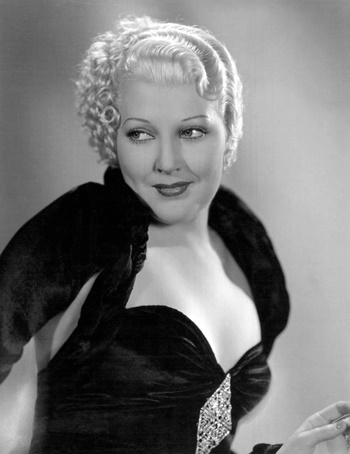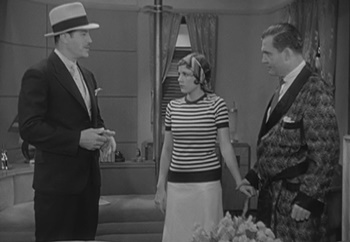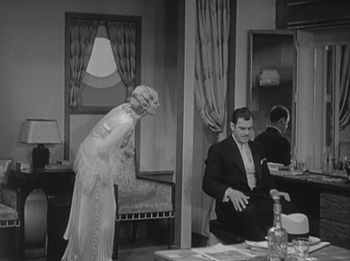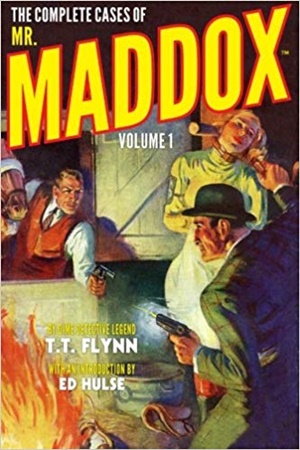A (Black) Gat in the Hand: Steven H Silver Asks ‘Can You Name This Hardboiled Flick?’
 A hallmark of my success here at Black Gate has been to get other writers, with actual talent, to write for my column. I accomplish that feat again today as fellow Black Gater Steven H Silver takes a look at a classic film and gives it a hardboiled review. You may not immediately guess what film he’s looking at, although I’d bet you’ve heard of it before. Take it away, Steven!
A hallmark of my success here at Black Gate has been to get other writers, with actual talent, to write for my column. I accomplish that feat again today as fellow Black Gater Steven H Silver takes a look at a classic film and gives it a hardboiled review. You may not immediately guess what film he’s looking at, although I’d bet you’ve heard of it before. Take it away, Steven!
I’m going to look at one of the stranger “Gat” films. With action taking place in a variety of places, ranging from a state room on an ocean liner to a swanky long island party to a rousing conclusion in a barn.
Rockliffe Fellows plays “Big Joe” Helton, an older mob boss who is returned from Europe aboard an ocean liner with his daughter, Mary, played by Ruth Hall. Also on board the ship is Alky Briggs, played by Harry Woods, Briggs is accompanied by his wife, Lucille, portrayed by Thelma Todd, right at the midpoint of her career. Oddly enough, aside from these women, both of these men seem to be traveling without any members of their gangs, although they both are able to rectify that oversight.
We’re first introduced to Briggs in his cabin, where his wife, Lucille is complaining that he has been ignoring her on the voyage. Briggs makes it clear that he isn’t making a play for any other woman, rather his purpose for being on the ship is because he has determined that being alone on the ocean is the perfect time to attempt to muscle in on Helton’s territory. Here is a huge difference between Lucille’s language and Briggs. The writers have given Thelma Todd natural dialogue and she delivers it well. Briggs’ lines are written almost as a parody of a movie gangster, with no recognition that he and Lucille are in an actual relationship and Woods delivers them in a such a stereotypical manner that the only conclusion a viewer can have is that he’s decided to play tough-guy Briggs as a satire.
As Alky is about to storm out of their argument, a tailor’s assistant enters the room with one of Lucille’s dresses. With the admonition that she should complain to the tailor, Briggs leaves. The screenwriters now make the rather odd decision to stay with Lucille rather than show what Briggs is up to. Lucille does, in fact, commiserate with the tailor, who life Alky, seems to be in a completely different conversation than she is. However, he is happy to stick around and flirt with her rather than return to his duties. The two begin to tango when Alky returns and orders Lucille from the room. After Briggs threatens to “lay [the tailor] out pretty,” the man begins to jabber away. The coolness of his nerve impresses Alky who decides to offer them a job. When one of the tailor’s colleagues enters the room, Briggs hands each of them a gat and orders them to accompany him to see Joe Helton.
Of note in this scene, while Alky and Lucille clearly have an unhappy marriage, there are indications that it goes beyond verbal sparring. Todd’s looks and motions indicate that Briggs is likely to be physically abusive towards her, although the screenwriters did not include any lines or actions to make this explicit.
While Alky and Lucille had a nice two room suite on the ship, it was relatively plain compared to Joe Helton stateroom. When we first see Joe, he’s dressed in a robe while finishing a meal. A waiter removes his tray and Briggs tips him handsomely before sitting down with the London edition of the Daily Sketch, which has devoted two columns to Helton’s return to the United States, referring to him as a Millionaire Racketeer and noting that his 18 year old daughter, Mary, has just completed finishing school and they are returning to open a new mansion.
 Mary enters the room and begins to berate her father for not having dressed, but Joe is having none of it. He’s a big wig now and plans on taking it easy for the rest of his life. They are interrupted by Alky Briggs, who has lost his two ersatz goons. When Briggs starts to tell Helton that he’s concerned about business, Helton sends Mary from the room. Briggs’ glances and comments as Mary leaves can only be taken as a threat. Once she’s gone, Briggs tells Joe that he wants Joe’s backing for his own gang, including a signed document to that effect. Helton refuses, telling Briggs that he isn’t taking sides and Alky will have to fight it out with Butch. As Helton tears up the note Briggs had handed him, Briggs pulls a gun on Helton, but two passersby attack Alky and bluff him into leaving. Helton hires them as bodyguards and goes for a walk on deck.
Mary enters the room and begins to berate her father for not having dressed, but Joe is having none of it. He’s a big wig now and plans on taking it easy for the rest of his life. They are interrupted by Alky Briggs, who has lost his two ersatz goons. When Briggs starts to tell Helton that he’s concerned about business, Helton sends Mary from the room. Briggs’ glances and comments as Mary leaves can only be taken as a threat. Once she’s gone, Briggs tells Joe that he wants Joe’s backing for his own gang, including a signed document to that effect. Helton refuses, telling Briggs that he isn’t taking sides and Alky will have to fight it out with Butch. As Helton tears up the note Briggs had handed him, Briggs pulls a gun on Helton, but two passersby attack Alky and bluff him into leaving. Helton hires them as bodyguards and goes for a walk on deck.
After leaving Helton’s stateroom, Briggs reconnected with the tailor and his partner, re-arming them and giving them instructions to shoot Helton when he leaves his room. They lose their nerve and when Briggs begins to confront them, Lucille appears and continues her argument with Briggs from their room as the bodyguards take the opportunity to leave the two to their domestic squabble.
Helton is relaxing in a desk chair, alone, when the tailor happens by. Rather than shoot him, as he was ordered to, the tailor offers his own services to Helton, who refuses them.
Meanwhile, the tailor’s partner has had several encounters with Mary and the two begin a budding romance, which they continue after the ship docks in New York.
In New York, Briggs I seen talking to his gang of toughs. He plans on infiltrating Mary Helton’s coming out party and assigned his men to attend as musicians. Although it would seem that Briggs is some sort of underling to Helton, is also appears Helton wouldn’t recognize the men who work directly for Briggs. One of them asks Briggs about the four bodyguards from the ship, all of whom seem to be working for Helton now, but Briggs assures his men that he has all four eating out of his hand and they’ll come through when the time is right.
At the party, Helton’s toughs are providing security while Mary continues her shipboard romance. Briggs’s men keep an eye on her while providing the music for the soiree which is a strange mix of formal dress and costume party. They are waiting for the go-ahead from Briggs. After Mary is introduced to society by Big Joe, Briggs reconnects with the tailor on the patio, sharing the plan. His men will kidnap Mary and take her to the old barn. Because he doesn’t give the tailor instructions about what he is to do, there is literally no reason for Briggs to share this information.
As soon as Briggs leaves the tailor, Lucille shows up at the party and reconnects with the tailor. It isn’t made clear if she knows Alky is there and it seems likely that he is unaware of her presence. Why she’s there is never explained, but she almost immediately begins flirting with the tailor again. When Briggs returns, she runs off, Cinderella style.
 The action takes a break for a musical interlude that include piano and harp solos as well as an operatic aria. It ends when the butler informs Big Joe that Mary has, in fact, been captured (you would think Briggs’s goons would have been busy playing music as part of their cover). Helton and the toughs he has providing party security head out to find additional reinforcements, but the four body guards from the ship head straight to the old barn, beating Big Joe’s men there and rescuing Mary from Alky Briggs.
The action takes a break for a musical interlude that include piano and harp solos as well as an operatic aria. It ends when the butler informs Big Joe that Mary has, in fact, been captured (you would think Briggs’s goons would have been busy playing music as part of their cover). Helton and the toughs he has providing party security head out to find additional reinforcements, but the four body guards from the ship head straight to the old barn, beating Big Joe’s men there and rescuing Mary from Alky Briggs.
The film has plenty of action, but the logic is short. Lucille moves in and out of the film for her scenes with Alky and the tailor, but never really has any sort of closure. Mary’s budding romance has a few cute moments, but the audience is never really invested in it. Briggs demonstrates himself as inept, both in personal relationships and in the way he runs his gang, indicating the Big Joe is right not to support him, although Helton seems successful enough that he would support just about anyone over Briggs.
Bob here again. Did you guess the movie? I didn’t include any pics to give it away. It’s the 1931 Marx Brothers classic, Monkey Business! The Marxes inverted the gangster tropes common at the time and made an excellent comedy out of them. Steven and I both think the Marxes were brilliant, and Monkey Business is further proof of that.
Prior posts in A (Black) Gat in the Hand – 2020 Series (18)
A (Black) Gat in the Hand: Hardboiled May on TCM
A (Black) Gat in the Hand: Some Hardboiled streaming options
A (Black) Gat in the Hand: Johnny O’Clock (Dick Powell)
A (Black) Gat in the Hand: Hardboiled June on TCM
A (Black) Gat in the Hand: Bullets or Ballots (Humphrey Bogart)
A (Black) Gat in the Hand: Phililp Marlowe – Private Eye (Powers Boothe)
A (Black) Gat in the Hand: Cool and Lam
A (Black) Gat in the Hand: All Through the Night (Bogart)
A (Black) Gat in the Hand: Dick Powell as Yours Truly, Johnny Dollar
A (Black) Gat in the Hand: Hardboiled July on TCM
A (Black) Gat in the Hand: YTJD – The Emily Braddock Matter (John Lund)
A (Black) Gat in the Hand: Richard Diamond – The Betty Moran Case (Dick Powell)
A (Black) Gat in the Hand: Bold Venture (Bogart & Bacall)
A (Black) Gat in the Hand: Hardboiled August on TCM
A (Black) Gat in the Hand: Norbert Davis – ‘Have one on the House’
A (Black) Gat in the Hand – with Steven H Silver: C.M. Kornbluth’s Pulp
A (Black) Gat in the Hand: Norbert Davis – ‘Don’t You Cry for Me’
A (Black) Gat in the Hand: Talking About Philip Marlowe
A (Black) Gat in the Hand – 2019 Series (15)
Back Deck Pulp Returns
A (Black) Gat in the Hand Returns
A (Black) Gat in the Hand: Will Murray on Doc Savage
A (Black) Gat in the Hand: Hugh B. Cave’s Peter Kane
A (Black) Gat in the Hand: Paul Bishop on Lance Spearman
A (Black) Gat in the Hand: A Man Called Spade
A (Black) Gat in the Hand: Hard Boiled Holmes
A (Black) Gat in the Hand: Duane Spurlock on T.T. Flynn
A (Black) Gat in the Hand: Andrew Salmon on Montreal Noir
A (Black) Gat in the Hand: Frank Schildiner on The Bad Guys of Pulp
A (Black) Gat in the Hand: Steve Scott on John D. MacDonald’s ‘Park Falkner’
A (Black) Gat in the Hand: William Patrick Murray on The Spider
A (Black) Gat in the Hand: John D. MacDonald & Mickey Spillane
A (Black Gat in the Hand: Norbert Davis goes West(ern)
A (Black) Gat in the Hand: Bill Crider on The Brass Cupcake
A (Black) Gat in the Hand – 2018 Series (31)
With a (Black) Gat: George Harmon Coxe
With a (Black) Gat: Raoul Whitfield
With a (Black) Gat: Some Hard Boiled Anthologies
With a (Black) Gat: Frederick Nebel’s Donahue
A (Black) Gat in the Hand: Thomas Walsh
A (Black) Gat in the Hand: Black Mask – January, 1935
A (Black) Gat in the hand: Norbert Davis’ Ben Shaley
A (Black) Gat in the Hand: D.L. Champion’s Rex Sackler
A (Black) Gat in the Hand: Dime Detective – August, 1939
A (Black) Gat in the Hand: Back Deck Pulp #1
A (Black) Gat in the Hand: W.T. Ballard’s Bill Lennox
A (Black) Gat in the Hand: Day Keene
A (Black) Gat in the Hand: Black Mask – October, 1933
A (Black) Gat in the Hand: Back Deck Pulp #2
A (Black) Gat in the Hand: Black Mask – Spring, 2017
A (Black) Gat in the Hand: Frank Schildiner’s ‘Max Allen Collins & The Hard Boiled Hero’
A (Black) Gat in the Hand: William Campbell Gault
A (Black) Gat in the Hand: More Cool & Lam From Hard Case Crime
A (Black) Gat in the Hand: MORE Cool & Lam!!!!
A (Black) Gat in the Hand: Thomas Parker’s ‘They Shoot Horses, Don’t They?’
A (Black) Gat in the Hand: Joe Bonadonna’s ‘Hardboiled Film Noir’ (Part One)
A (Black) Gat in the Hand: Joe Bonadonna’s ‘Hardboiled Film Noir’ (Part Two)
A (Black) Gat in the Hand: William Patrick Maynard’s ‘The Yellow Peril’
A (Black) Gat in the Hand: Andrew P Salmon’s ‘Frederick C. Davis’
A (Black) Gat in the Hand: Rory Gallagher’s ‘Continental Op’
A (Black) Gat in the Hand: Back Deck Pulp #3
A (Black) Gat in the Hand: Back Deck Pulp #4
A (Black) Gat in the Hand: Back Deck Pulp #5
A (Black) Gat in the Hand: Joe ‘Cap’ Shaw on Writing
A (Black) Gat in Hand: Back Deck Pulp #6
A (Black) Gat in the Hand: The Black Mask Dinner
 Bob Byrne’s ‘A (Black) Gat in the Hand’ was a regular Monday morning hardboiled pulp column from May through December, 2018 and again from August through December, 2019. It returned in June, 2020.
Bob Byrne’s ‘A (Black) Gat in the Hand’ was a regular Monday morning hardboiled pulp column from May through December, 2018 and again from August through December, 2019. It returned in June, 2020.
His ‘The Public Life of Sherlock Holmes’ column ran every Monday morning at Black Gate from March, 2014 through March, 2017 (still making an occasional return appearance!).
He organized ‘Hither Came Conan,’ as well as Black Gate’s award-nominated ‘Discovering Robert E. Howard’ series
He is a member of the Praed Street Irregulars, founded www.SolarPons.com (the only website dedicated to the ‘Sherlock Holmes of Praed Street’) and blogs about Holmes and other mystery matters at Almost Holmes.
He has contributed stories to The MX Book of New Sherlock Holmes Stories – Parts III, IV, V, VI and XXI.

I knew it was Monkey Business before I got to the end of the second sentence. (Joe Helton was the giveaway.) Got to go now – the captain is waiting to chase me around the deck.
Steven came up with this idea from a comment in a conversation we had.
I’m thinking of redoing the entire plot of Arsenic and Old Lace (not as a movie, but a plot summary) as a true hardboiled story. Similar idea.
Would be fun.
There are (milder) hardboiled elements in Animal Crackers and Horse Feathers too.
There are a lot of instances where stories could be shifted into entirely different genres with just a change of emphasis. I’ve always wanted to see King Lear done as an outright slapstick farce.
I wrote about half of a Nero Wolfe short story with Wolf J. Flywheel hiring Wolfe to help him solve a murder at The Big Store. Writing Groucho and Archie together is fun. And it’s got the terrific Margaret Dumont.
I kinda wrote myself into a corner, but I’ll finish it some time.
Well, as Shakespeare said to Nathan Hale, “I always get my man!”
Agh…. I totally failed to guess.
The flat description totally led me astray.
I think that was Steven’s goal. We used pics that didn’t include the Marx Brothers for that reason.
I did not know the story behind Thelma Todd’s death. I’m already toying with the idea of a Hollywood studio detective story based on it.
Look at her wikipedia entry. Suspicious, to say the least.
It’s one of the great Hollywood mysteries, along with the deaths of Thomas Ince and Natalie Wood, and more genuinely suspicious than either of those.
Thomas – I certainly thought it was intriguing when I started reading about it.